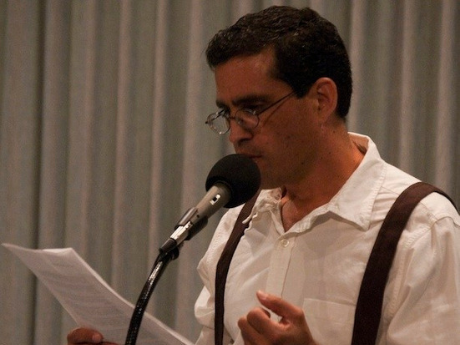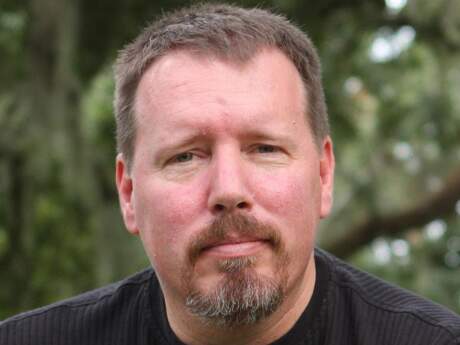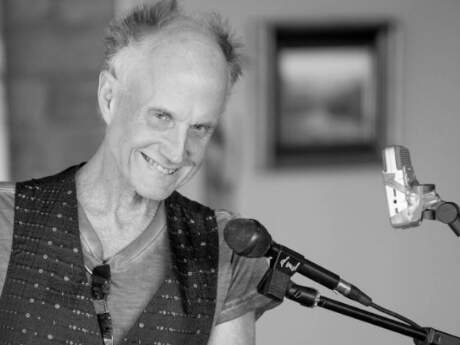Red, White, & Blue
Rodrigo Toscano

La Observadora
Feeling the initial jolts of an explosive, subterranean social transformation is something that she lives for, especially when the jolts are perceived to erupt from nearly frozen bystanders' warm, pulsating bodies.
First, their emotions brighten to a maximum luminosity, spectacular accidents in thought causing intention to splinter into multiple paths of action; next, their ideals deflate and tuck hard against actual lived conditions; after that, their sense of public vanity dissipates, a scattering plume of smoke to nowhere; finally, their dogged dedication to reason clamps its straining claws into a rapidly unfolding speculative science of a just-around-corner "reality."
The jolts come in a series of flickering dream images, sending waves of recovered historical memory into her sense of The Now.
She adores this new "little demon" friend more than anything else in the world. The feeling is mutual.
All rights reserved. Reprinted with the permission of the author.
Do you value the examination of the political in poetry? If so, what experience(s) taught you its importance?
It's inconceivable to me to think of poetics as not being intersected by politics. "Politics" however, is not a singular point of reference in social time & space, it is rather a wide and complex arena of social activities. I think we often confuse "ideology" + "policy" as being the two domains that make up "politics." Of course, those domains are very key and active regions of the "political," but the field of "politics" is made up of many more regions. And poetry is often (thank goodness) an exploration of those regions. How else explain the enduring "political" effects of poets like Emily Dickinson, whose poetry isn't as we (so obnoxiously) say these days "on topic."
If you write about politics frequently, what issues, difficulties, advantages and disadvantages do you negotiate? Which poets do you draw on when conducting such negotiations?
In my "day job," I work in "politics," specifically labor movement politics around Health, Safety, and the Environment. So speaking somewhat clearly and accurately about lines of analysis and action in that world are at a premium. But the kind of "analysis" and "action" that poetic activity requires is very different. Poetry, for me, is a place to overtly migrate discourses onto one another, to be "off topic." It's also about having a near-lunatic commitment to speaking subaltern languages that have been heretofore unspoken.
What 'responsibility' does an artist have to artistically engage his or her own politic?
Whatever responsibility a person feels to be his or hers to be at any given time is "the politic." When people are ready to speak that's when they're ready to speak. Pushiness of any kind, whether it comes from aesthetics, politics, whether it is "scene" or "movement" generated, encourages borrowed ethical and moral platitudes. That's what makes aesthetic "formations" so infuriating: two to six people cream to the top and the rest are there just for fuck fodder.
In 2008, Horace Engdahl, the secretary of the Nobel prize jury, wagged his finger at American writing saying that "[American writers] don't really participate in the big dialogue of literature. […] That ignorance is restraining." What do you think? How have recent American poets engaged with or neglected the so-called 'big dialogue' of literature? Is this 'big dialogue' a political one?
I actually get what he meant by that comment. The sheer tonnage of poets and poetry grows year by year, and the social, civic "place" of the poetic arts here in the U.S. remains the same: nowhere. And so there's a grand scramble to gain slippery footholds on the lost forgotten lily pods of our cultural dreams. One result is that there's not much energy left, or desire, or will to think how "the work" might (or might not) be in dialogue with the rest of the world.
That said, there are projects out there right now that have striven to keep the lines of cross-cultural transmission open. For example, Pierre Joris' Nomadics blog. Checking into that site once every few weeks can be so refreshing. So much of the "rest of the world" (the very phrase is nationalist chauvinistic!) gets play. Also, the recent critical collection, A Megaphone (edited by Juliana Spahr and Stephanie Young) that project too aimed at arcing across the sanctioned precincts of "American Poetry."
Is there room for romantic or rugged individualism in political poetry (as opposed to a capacious perspective of Whitman or other past poets)? If so, where is its place?
There's room for a million-strong herd of rhino's to roam free in American Poetry. The problem is who is going to scoop up all the remains.
—
Walt Whitman has been a Latin American poet since about 1900. There's been excellent efforts to import his poetics since then. I hope more are on the way.
Where do you draw the line between poetry and propaganda? What is the purpose of such a line? Should today's poet be concerned with editorial censorship?
Drawing lines (properly speaking, not curves, or squiggles) requires something like a protractor or ruler.
Very few poets you'll ever meet wish to be either one of those. If perchance you meet one who wants to be a useful tool for a Draftsman of the "Real," at the very least note the kinds of erasers on the table—very similar to yours, you might notice.
What are your thoughts on shifts in the state of the political voice in contemporary poetry, from the early modernist to the beat poets and black arts movement, to today? Where are we now? Where are we going?
Here are two things that I see happening in American Poetry:
1). As regards the MFA Industry: Poetry is there. It's staged in the middle of an immense convention floor that is empty of people. It is in the shape of a huge ball of pudding that's getting bigger and bigger by the second. You can actually observe its growth as it knocks out the ceilings and walls. Now it's rolling along. Now it's headed for the shoreline. Now it's half submerged in the bay. Now it's in the mid-Atlantic, bobbing along with global currents, out of site, out of mind.
2). American Poets were at the heart of the Occupy movement. Many of them found themselves in the middle of its strongest whirlpools.
Poets excel at "heart." But they also excel at "spleen," not to mention, gonads.
The sweetest nectar from that movement is yet to appear on the scene.
Are U.S. poets starting to wake up to their own bodies as poetic actors? Strong signs abound that the answer is yes; but more importantly is that they're starting to awake unto to the bodies of others. Herein lies a great hope, a Whitmanian hope one might even say. A full frontal dive into the fabric of our inter-connectedness is what seems to be just around the corner.
The main reasons I temporarily shut down Collapsible Poetics Theater this past year was because things had started really heating up on the streets. The CPT was always about the raw desire to slough off deep political slumbering through an exploration of the political body's urges as it careened through and even slammed straight into the rhetoric of "real."
Technique, artistic technique, cannot be honed enough; but even so, achieving openness towards desire and need, in the end, has more of an impact on one's poetics. This is what I go by, more or less.
* * *
Rodrigo Toscano's newest book is Deck of Deeds (Counterpath Press 2012). His previous book, Collapsible Poetics Theater, was a 2007 National Poetry Series Selection. His poetry has appeared in numerous anthologies, including Against Expression, Diasporic Avant Gardes, and Poetic Voices Without Borders, Best American Poetry, Criminal's Cabinet: An anthology of poetry and fiction and McSweeny's "Poets Picking Poets." His works have been translated into French, Dutch, Italian, German, Portuguese, and Catalan. Toscano works for the Labor Institute and United Steelworkers under a National Institute for Environmental Health Science 5 year grant. He works out of a laptop, tethered to a Droid, residing in airports, occupying poetics in midflight, and somehow also manages to live happily in the Greenpoint Township of Brooklyn.
Published September 2012.


